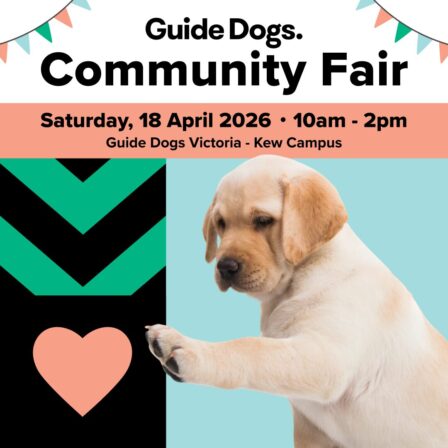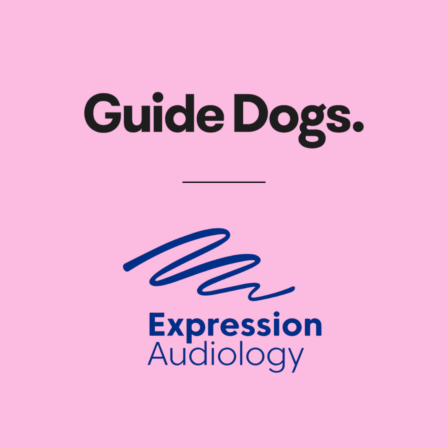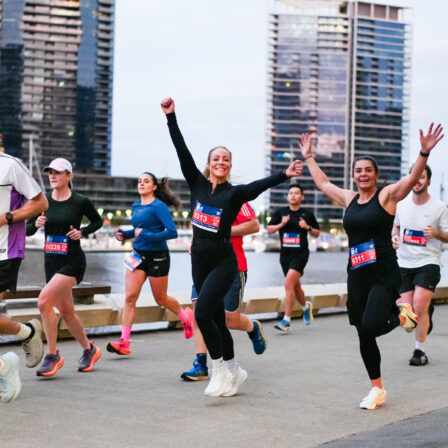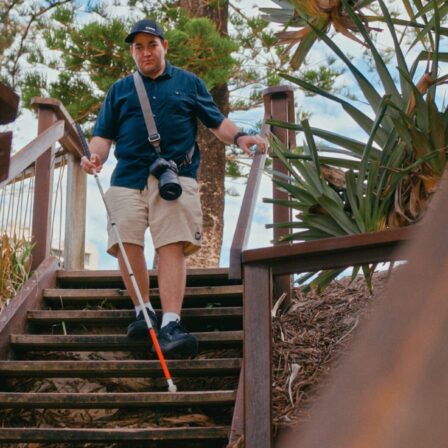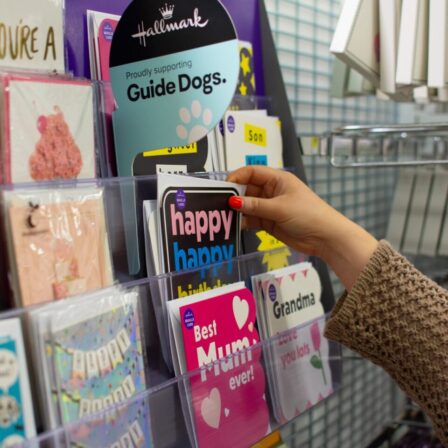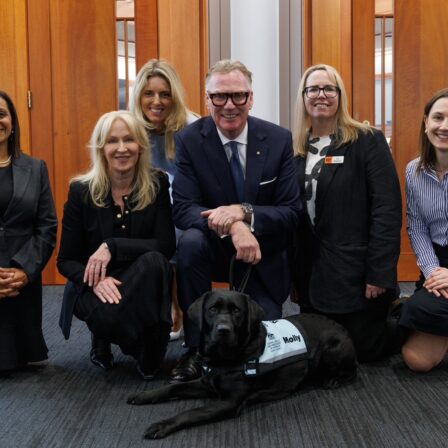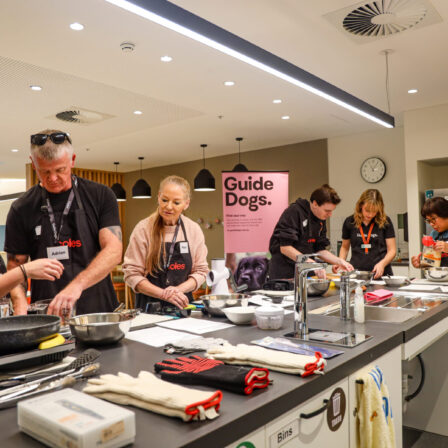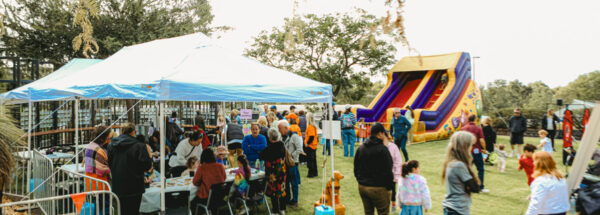News
Happy Occupational Therapy Week!
This Occupational Therapy (OT) Week we’re celebrating the World Federation of Occupational Therapists’ theme ‘Unity Through Community’.
Occupational Therapists (OTs) play a vital and dynamic role in helping people engage with, and participate in, their community – in whichever way is meaningful to them. Not only do we work across a broad range of settings, we also help people engage in meaningful occupations.
At Guide Dogs Victoria, the OT Team works with Clients with low vision or blindness to participate in meaningful activities at home and in the community. Our Clients encounter many challenges in their daily life compared with their sighted peers, for which they require specialised support. We provide a Client-centred approach to each individual with an understanding of their strengths and weaknesses. We work with our Clients to build their skills and confidence using low-vision strategies and equipment to achieve their goals. These include being able to make a hot drink, identifying clothes and food in the cupboard, or participating in community activities safely.
This OT Week, as much as we want to recognise and celebrate the OT profession, we also want to highlight the vital roles other professionals have at Guide Dogs Victoria, such as Orthoptists, Orientation and Mobility Specialists (O&Ms), and Assistive Technology Specialists. As a multi-disciplinary team, we utilise a holistic approach to address different challenges our Clients have in their daily activities. Without each other, we are unable to help Clients achieve the best outcomes.
We would like to share Dennis’s story on how the multi-disciplinary team has helped him achieve his goals. Dennis is a GDV Client who has received support from OT, O&M and Orthoptics. Despite his age and vision loss, Dennis remains very independent and is an active member of the community. Dennis participated in a video interview and the answers below were transcribed directly from the video.
1. Can you tell us a little about yourself?
I am a retired mechanical design engineer, a regular church-goer and am preoccupied with my hobby of model railways. I have lived on my own for the last 35 years, so I spend quite a bit of my time doing usual housekeeping, gardening and shopping routines, which means I’m rarely bored.
2. Can you tell us a little about how much you can see?
In general, I can see far distances reasonably well, but I can’t see the details too easily. For example, if I meet a person in the street, I can see from many metres away that there is a person coming towards me. But they have to get probably within about two metres before I can see who they are. This is why I’m glad I don’t drive any longer, because in cars there isn’t time to adjust to the change in sight to get the details of what things are.
3. How did Occupational Therapy and other supports such as Orthoptists and O&Ms support you in your life?
Recently, my family persuaded me to get in touch with the My Aged Care organisation. Because of my eyesight problems, they referred me to Guide Dogs Victoria, who have arranged visits by various people, such as Occupational Therapist and an Orthoptist, to assess where I’m at and what the problem really is. They also provide advice and, in many cases, helpful equipment, such as a standing lamp, which is a large magnifying glass with light between the magnifying glass and the object. I also have a table lamp, which is LED, which puts a large amount of light in a particular spot without any great disadvantage. I have been provided with a light white walking cane, which I can use to assess the state of the pavement in front of me. I also have an SOS/alarm system which gets in direct contact by pressing a button. This means if anything goes wrong, I can press the button and I’m in contact with other people very quickly.
4. How has our input helped you be more active in the community?
The equipment is helping me see more clear detail in things. As a regular church-goer, I find it much easier to read the hymn books. In my hobby of model railways, I find it much easier to see the details in model mechanisms. I do my own shopping, which means I walk two or three kilometres. The equipment enables me to feel confident about walking the distances and seeing the details of goods in the shops.
5. Do you have any words of wisdom to share with younger people who are experiencing vision loss?
As a young person, if you are aware that your sight is becoming impaired, don’t be scared of seeking help. Don’t be too stubborn. Get help. Go to somebody like Guide Dogs Victoria, who can give you an assessment on your sight and provide help. In some cases, you can go to a good optician who can at least provide you with general-purpose spectacles or even special reading spectacles. Don’t be scared, get it sorted out!
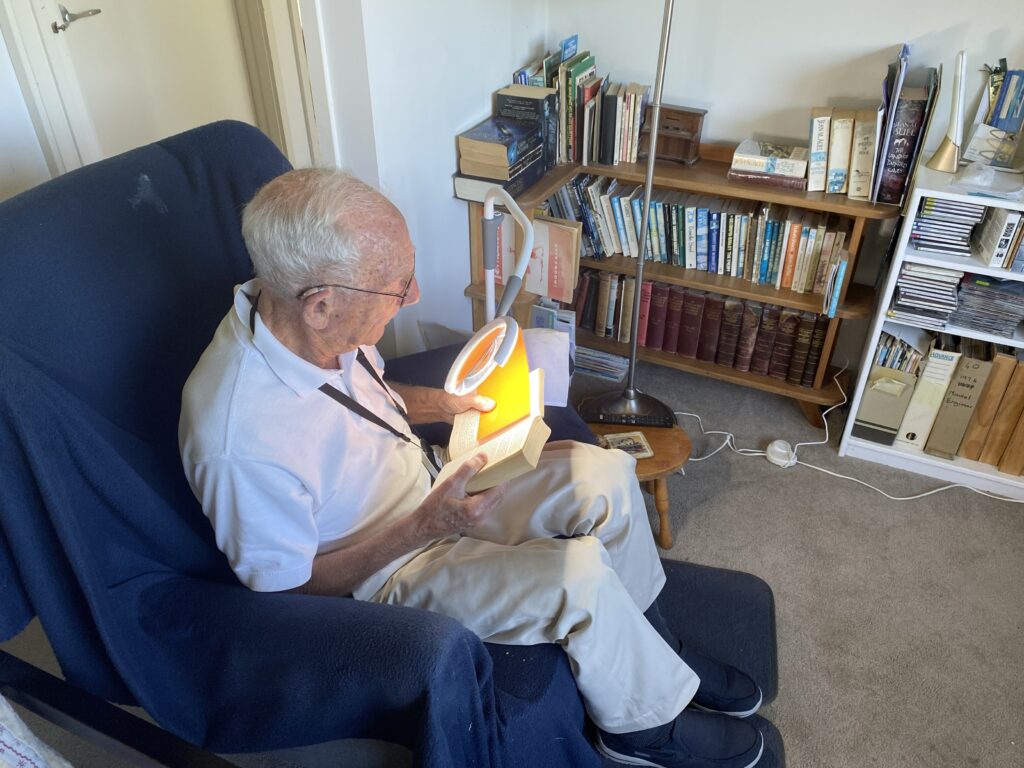
Image description: Dennis sitting in an armchair in his living room. He is reading a book using the magnifying lamp and a high contrast guide.
We hope that you are inspired by Dennis’s story. He shared some great insights into vision loss and independent living. We would like to convey a message to the greater community that it is important to recognise when you need help and then seek help accordingly. Just as the theme ‘Unity through Community’ says, we are all part of the community, and we are all connected as a whole. We are here to help each other.
By the OT Team at Guide Dogs Victoria.
